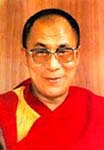
The Rediff Interview /The Dalai Lama
'Religious institutions and politics should be separate. If they are mixed there
will be complications'
 That is at the individual level. At the state
level, they say religion should be kept separate from politics.
But as religion affects everything you do, is it possible to
separate the two?
That is at the individual level. At the state
level, they say religion should be kept separate from politics.
But as religion affects everything you do, is it possible to
separate the two?
As far as institutions are concerned, religious institutions
and politics should be separate. If they are mixed there
will be complications. But for religious-minded people to carry
a responsibility, whether in administration or in politics or
other areas, would be beneficial. Generally, if you see a genuine
believer -- what people usually call god-fearing man -- in politics, you will find
he has some kind of
self-discipline, even though he may have all the power to do whatever
he likes.
You have been in India now for something like
37 years. Has your stay here affected you at all? Has it given
you any new insights, any others ideas about religion, about life?
Of course, being a refugee and no longer having
to adhere to protocol, it becomes much, much easier to meet and
talk and contact various people from different backgrounds. There
is also no longer any room for pretensions. I think its brings
one closer to reality. I think it is very, very useful
to become realistic.
That is one thing. Then the spiritual aspect. In
the last 37 years, I think I gained quite useful spiritual
experiences. I also think I have made some contribution towards
harmony among different religions, especially with Christianity
and Judaism. And now among some Indian traditional religions --
with Jains and different Hindus.
Have you been meeting different religious leaders?
Oh yes. I do not try to propagate Buddhism. My whole
thinking is how to make a contribution from my experience, from
my tradition. Not to propagate. So nowadays, I get the
feeling that many Christians and Jews, and to some extent some
Muslims, think I am someone who accepts the harmony
of other religions.
In fact, on a few occasions, some Christian
organisations requested me to explain Christianity according to
my Buddhist philosophy. They very much appreciated my views, though
it proved to be a difficult task. The non-believer in creator
trying to explain about the creator!
Do you believe in some kind of supreme reality?
No. But in a higher individual being, yes. Like
Gautam Buddha and some others who eventually became
enlightened. They achieved
it through training, through transformation. So today, when compared
to us, they are higher beings; we can seek some blessings
and guidance from them.
There is another world, then -- a world of the
spirit? Or is it the end after you are dead?
No, it is not the end. Buddhists believe in the rebirth
theory.
But then there is an end to rebirth? Once you
achieve nirvana?
Yes, it is the end of rebirth. But that does not mean
the end of the person, of the being. The being is still there.
This interview first appeared in New India Digest. Readers who wish to subscribe to this bimonthly magazine on contemporary India may respond to New India Digest, Sahaydri Sadan, Tilak Road, Pune 411 030.
Tell us what you think of this interview
|





